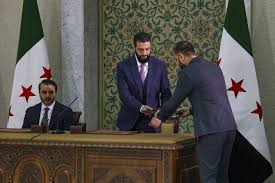Human Rights Watch (HRW) has raised serious concerns about Syria’s newly adopted constitutional declaration, warning that it grants sweeping powers to the interim president and threatens to derail the country’s path toward a democratic and rights-respecting transition.
The declaration, signed on March 13 by interim President Ahmad al-Sharaa in Damascus, is intended to govern Syria during its transitional period, set to last five years until national elections are held and a permanent constitution is adopted. However, HRW warns that the document “concentrates power in the executive” and lacks meaningful safeguards to protect judicial independence and ensure checks on presidential authority.
“Without stronger safeguards and independent oversight, this declaration risks consolidating executive control at the expense of fundamental freedoms at a crucial time for Syria’s future,” said Adam Coogle, deputy Middle East director at Human Rights Watch. “Given the rampant unchecked authority of the previous government, it is paramount for Syria to establish a system that holds everyone accountable for their abuses and crimes.”
Key Concerns: Oversight, Judiciary, and Legislative Independence
HRW’s statement outlines specific articles that it views as especially troubling. Article 47, for instance, grants the president the exclusive right to appoint all seven members of the Higher Constitutional Court without parliamentary or institutional oversight—raising concerns about judicial impartiality and the potential for political interference in constitutional interpretation.
Similarly, article 24 allows the president to appoint one-third of the transitional parliament directly, while the remaining two-thirds are selected by a committee whose members are themselves appointed by the president. This structure, HRW warns, risks transforming Syria’s transitional institutions into extensions of executive power rather than independent governing bodies.
Although the declaration claims to uphold judicial independence and human rights, HRW argues these provisions are undermined by the absence of mechanisms to enforce them. “The effectiveness of these rights guarantees will depend entirely on the existence of independent institutions capable of holding the president and executive officials accountable,” the group said.
Promises of Justice Clouded by Structural Imbalance
The declaration does include provisions aimed at transitional justice and reversing abuses from the Assad era. These include repealing exceptional laws, annulling terrorism court rulings, restoring confiscated property, and forming a transitional justice body to address war crimes and crimes against humanity. However, HRW points out that without external oversight or guarantees of institutional independence, such measures may remain symbolic rather than transformative.
Article 49(3), which criminalizes “glorifying the obsolete al-Assad regime” or “denying his crimes,” is also flagged as potentially suppressing free expression. HRW notes that the vaguely worded article could be used to silence dissent or punish political opposition, casting further doubt on the declaration’s commitment to democratic norms.
A Presidential System Without Accountability
President al-Sharaa, who assumed office in January 2025 following a conference of armed groups, holds expansive powers under the new charter. Articles 31 and 35 enable him to appoint and dismiss ministers unilaterally. According to Abdulhameed Al-Awak, a member of the drafting committee, cabinet ministers are accountable solely to the president—effectively eliminating parliamentary oversight.
The lack of impeachment mechanisms, no legislative authority to approve or remove ministers, and the concentration of all major appointments in the hands of the president, HRW warns, “risk entrenching authoritarianism under the guise of transition.”
Call for Revisions and a True Path to Democracy
Human Rights Watch is calling on Syrian authorities to revise the constitutional declaration, urging them to incorporate robust protections for judicial independence, ensure checks on presidential powers, and establish credible oversight bodies.
“Syria’s transition should be a pathway to a rights-respecting democracy – not a pretext for entrenching authoritarian control,” Coogle said.
As the international community watches closely, the success or failure of Syria’s transitional process may hinge on whether its foundational legal framework fosters institutional accountability—or simply repackages centralized rule under a new name.
This article was translated and edited by The Syrian Observer. The Syrian Observer has not verified the content of this story. Responsibility for the information and views set out in this article lies entirely with the author.


